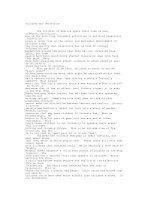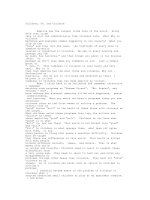cause and effect essay
Bạn đang xem bản rút gọn của tài liệu. Xem và tải ngay bản đầy đủ của tài liệu tại đây (56.98 KB, 2 trang )
WEEK 1,2,3,4 – WRITING 4 - LE PHUONG THAO
THE CAUSE AND EFFECT ANALYSIS ESSAY
Introduction
Cause and effect are two separate ways of viewing an event. Causes are
the reasons why an event happened. Most events result from a number of
causes, which do not necessary related. For example:
Countless bills to pay for ……………………………………………….
putting my mother in the
Needs to be taken care of ………………………………………………
>
nursing home
My father’s welfare …………………………………………………………
In cause paper, just develop only those causes that are closely related in
time to the event. It means that you should not cite a cause that happened 12
years earlier. Also beware of false causal relationship. Ex: You should not
mention that the cause of your obesity is the hobby of collecting stamps.
Effects are the results of a particular occurrence. The effects should be
distinct and separate from one another. Furthermore, the effects should not be
too distant in time, too. For example:
……………………> Have little privacy
Being a Celebrity ……………………> be under constant pressure
……………………> Have no safety
How to write
1. Thesis statement:
In your thesis statement you should make it clear to the readers whether
the essay is being developed by cause or by effect.
* A thesis statement for a causal analysis states briefly the causes to be
discussed. It does not have to be persuasive. If the thesis presents a cause
statement, your body paragraphs should discuss the cause relationships. The
key question is, “What caused this?”
Ex: Child violence is caused by lack of parental attention, parental abuse and
parental immaturity
* A thesis statement for an effect analysis just states the central idea. For
example: Giving up smoking will bring us many benefits. If the thesis presents
an effect statement, your body paragraphs should discuss the effects. The key
question is, “What effects result from this cause?”
Ex: Watching violent films has a great impact on the child’s psychological and
physiological condition.
2. Organization
When discuss or analyze causes or effects, we should be aware that they
are immediate (also called direct) causes/effects or remote (also called indirect)
causes/effects. For example: The causes for my fear of the water: I can not
swim (immediate cause). My mother had an unreasonable fear of the water
(remote cause). The effects of watching TV: More people get eyestrain
(immediate effect). People get fat (remote effect).
* In a cause essay, you should plan to spend one body paragraph on each
of the causes. Of course, this paragraph provides explanation, facts … any
evidences that show how it contributes to the effect. All the body paragraphs
can be arranged according to the order of importance (the most important
last), order of interest (less interesting to more interesting), or the order of
familiarity (obvious to less obvious)
* In an effect essay, you should also plan to spend one body paragraph
on each of the effect. Of course, this paragraph provides explanation that
shows the relationship between the cause and the effect. All the body
paragraphs should be arranged according to the order of importance (from the
most important/the immediate effect to the less important/remote but worth
discussing effect).
3. Composition skills
Common transitions
For causes
because, due to, on cause is, another is, since, for, first, second
One reason why ...
One of the most important reasons why ... is
The main reasons is ...
There are other reasons, too, ...
For effects
consequently, as a result, thus, resulted in, one result is, another is, therefore,
as a consequence, since, as, so
Structures showing cause and effect
leads to
results in (daãn ñeán kquaû)
NOUN
NOUN
results from (do bôûi)
causes
has an effect on
Ex: Smoking causes lung cancer.
Lack of exercise can lead to poor health
* One (The) cause of + noun is + noun. Ex: One cause of poor health is a lack
of exercise.
* As a result, sentence Ex: As a result, she suffers from poor health.
* As a result of + noun Ex: As a result of her poor health, she can not receive
that job.
* Because of + Noun
* The (One) effect (cause) of + noun + is that
Adverbial clauses of Cause and Result
* Because
* Since
NOUN
So/such ……… that
Ex: This car requires so much gas that I have decided not to buy it.
EMAIL:









